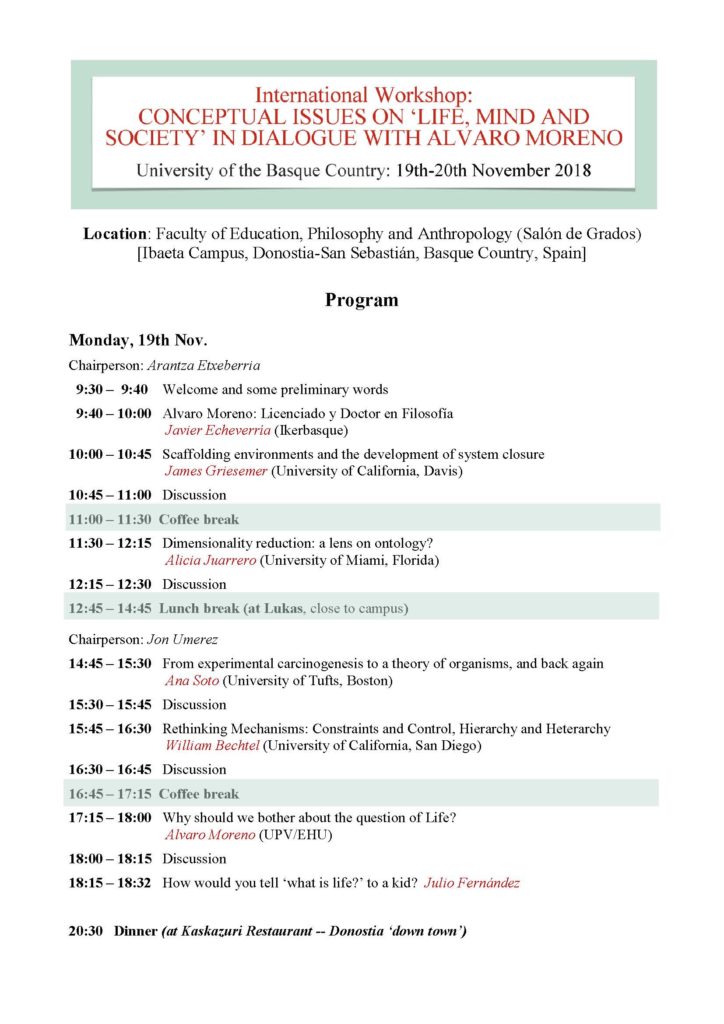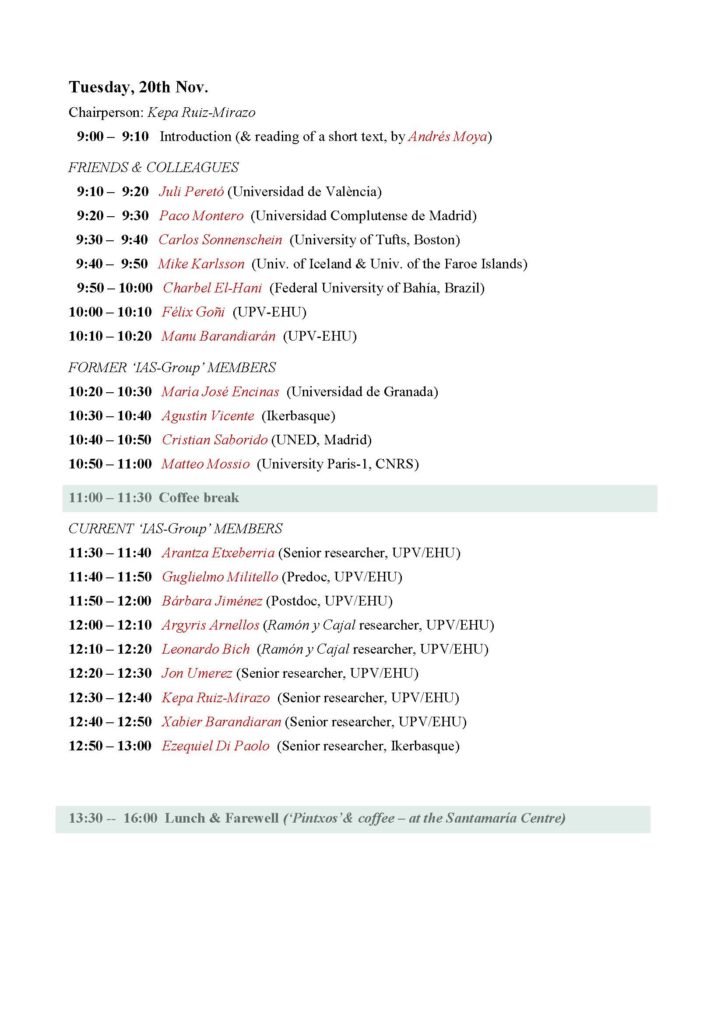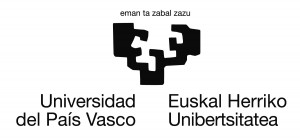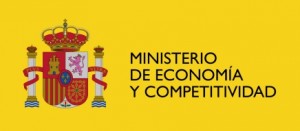Call for Papers
Workshop “Synthetic Modeling of Life and Cognition: Open Questions” (SMLC 2013)
12-14th September 2013, University of Bergamo, Italy
Organizers:
Luisa Damiano (University of Bergamo)
Vincent C. Müller (Anatolia College/ACT & University of Oxford)
In recent decades researchers in various scientific domains have been working intensely on procedures directed to exploring life and cognition in a “synthetic” way, i.e. through modeling in artificial systems. Research on biological and cognitive processes is thus been increasingly based on implementations in “software” (simulations), “hardware” (robots) and “wetware” (chemical systems) used as scientific models of the processes in question. This scientific development is often seen as the emergence of a new general methodology, a “synthetic methodology”, slated to become a dominant force in science. This synthetic methodology poses a challenge for both science itself and the philosophy of science: to define the possibilities, the limits, and the ways of the synthetic modeling of life and cognition, and its relevance for biological, behavioral, cognitive, and social sciences.
The workshop “Synthetic Modeling of Life and Cognition: Open Questions” will tackle this challenge by creating a strongly interdisciplinary forum that can formulate and address these fundamental questions. The workshop brings together pioneers of the synthetic exploration of life and cognition from different scientific domains (computer science, synthetic biology, cognitive, developmental, social robotics…), and invites them to discuss with philosophers and other specialists studying this emerging form of scientific investigation.
Invited speakers
- Minoru Asada, Osaka University, Japan
- Angelo Cangelosi, University of Plymouth, UK
- Luciano Fadiga, University of Ferrara, Italy
- Stuart Kauffman, University of Calgary, Canada
- Pier Luigi Luisi, University of Rome Three, Italy
- Giorgio Metta, Italian Institute of Technology, Italy
- Giulio Sandini, Italian Institute of Technology, Italy
- Ricard Solé, Pompeu Fabra University, Spain
Call for Papers
The SMLC 2013 workshop adopts an “Open Questions” format. – This means that the SMLC 2013 call for papers contains a list of questions on the synthetic modeling of life and cognition formulated by members of the Program Committee and other selected specialists on the basis of their expertise and in accordance with the topics of the workshop.
Deadline: 30.06.2013
Complete Call for Papers: http://www.pt-ai.org/smlc/2013/calls
Call for Papers
Workshop “Synthetic Modeling of Life and Cognition: Open Questions” (SMLC 2013)
12-14th September 2013, University of Bergamo, Italy
Organizers:
Luisa Damiano (University of Bergamo)
Vincent C. Müller (Anatolia College/ACT & University of Oxford)
In recent decades researchers in various scientific domains have been working intensely on procedures directed to exploring life and cognition in a “synthetic” way, i.e. through modeling in artificial systems. Research on biological and cognitive processes is thus been increasingly based on implementations in “software” (simulations), “hardware” (robots) and “wetware” (chemical systems) used as scientific models of the processes in question. This scientific development is often seen as the emergence of a new general methodology, a “synthetic methodology”, slated to become a dominant force in science. This synthetic methodology poses a challenge for both science itself and the philosophy of science: to define the possibilities, the limits, and the ways of the synthetic modeling of life and cognition, and its relevance for biological, behavioral, cognitive, and social sciences.
The workshop “Synthetic Modeling of Life and Cognition: Open Questions” will tackle this challenge by creating a strongly interdisciplinary forum that can formulate and address these fundamental questions. The workshop brings together pioneers of the synthetic exploration of life and cognition from different scientific domains (computer science, synthetic biology, cognitive, developmental, social robotics…), and invites them to discuss with philosophers and other specialists studying this emerging form of scientific investigation.
Invited speakers
- Minoru Asada, Osaka University, Japan
- Angelo Cangelosi, University of Plymouth, UK
- Luciano Fadiga, University of Ferrara, Italy
- Stuart Kauffman, University of Calgary, Canada
- Pier Luigi Luisi, University of Rome Three, Italy
- Giorgio Metta, Italian Institute of Technology, Italy
- Giulio Sandini, Italian Institute of Technology, Italy
- Ricard Solé, Pompeu Fabra University, Spain
Sponsors
- Università degli studi di Bergamo, Italy
- Research Center for Ars Vivendi at Ritsumeikan University, Kyoto, Japan
- EUCog, European Network for the Advancement of Artificial Cognitive Systems, Interaction and Robotics
Call for Papers
The SMLC 2013 workshop adopts an “Open Questions” format. – This means that the SMLC 2013 call for papers contains a list of questions on the synthetic modeling of life and cognition formulated by members of the Program Committee and other selected specialists on the basis of their expertise and in accordance with the topics of the workshop.
The SMLC 2013 workshop questions are cutting-edge open questions defining the agenda of the nascent interdisciplinary community dedicated to support the reflected and cooperative development of the synthetic modeling of life and cognition.
We welcome abstracts presenting and critically supporting original approaches directed to tackle the issues defined by the questions, and able to stimulate discussions and the emergence of new research lines in the interdisciplinary community created by the workshop.
The list of the SMLC 2013 workshop open questions can be found below. The questions are divided in three groups on the basis of their contents, and each question has an ID number.
We invite specialists from all the different research fields involved in this highly interdisciplinary forum to submit abstracts. In particular we welcome researchers from biology, synthetic biology, computational biology, AL, cognitive sciences, sciences of complex systems, computer sciences, AI, cognitive robotics, developmental robotics, social robotics, philosophy of science, philosophy of mind, philosophy of biology, philosophy of cognitive science, epistemology.
The Program Committee will select the papers to be presented at the workshop as talks through a double-blind peer review process.
We are planning to publish proceedings of the conference with a reputed publisher.
Information on how to prepare your abstract(s):
Each abstract should be anonymised for blind review and should include:
– the ID number and the short version of the question you are addressing;
– the title of your contribution;
– a text of up to 1000 words (excl. references) in a PDF;
– a short abstract of up to 150 words.
Deadline: 30.06.2013
Submission at: https://www.easychair.org/conferences/?conf=smlc2013
Latest Information at http://www.pt-ai.org/smlc/2013/paper-submission
For any further information, please do not hesitate to contact the organizers.
Thank you for contributing to this emergent research area!
SMLC 2013: Open Questions
This is the list of questions on the synthetic modeling of life and cognition, formulated by members of the Program Committee and other selected specialists on the basis of their expertise and in accordance with the topics of the workshop.
a) Synthetic exploration of life
(1) What are the possibilities and the limits of the synthetic study of the origins of life?
(2) Aiming at a universal biology: what can be the contribution of the synthetic methodology?
(3) Does the synthetic modeling of life need teleology?
(4) How can we test for artificial life?
b) Synthetic exploration of cognition
(5) What can synthetic biology offer to the study of cognition?
(6) What is the role of embodiment in the synthetic exploration of cognition?
(7) How can one build an agent aware of its environment?
(8) How can we model conscious experience?
(9) The extended mind thesis: can it be explored synthetically?
c) Possibilities, limits, ways and impacts of the synthetic modeling of life and cognition:
(10) The “sciences of the artificial” and the “sciences of the natural”: How can we guarantee positive interaction?
(11) What are the characteristics and roles of synthetic models?
(12) Do different forms of the synthetic modeling have different explanatory powers?
(13) Which levels of abstraction are appropriate in the synthetic modeling of life and cognition?
(14) What are the impacts of the synthetic methodology on the dichotomies ‘science/engineering’, and ‘artificial/natural’?
(15) The synthetic methodology: What are the environmental and social impacts?
Explanations of the open questions on
http://www.pt-ai.org/smlc/2013/open-questions
Call for Papers
Workshop “Synthetic Modeling of Life and Cognition: Open Questions” (SMLC 2013)
12-14th September 2013, University of Bergamo, Italy
Organizers:
Luisa Damiano (University of Bergamo)
Vincent C. Müller (Anatolia College/ACT & University of Oxford)
In recent decades researchers in various scientific domains have been working intensely on procedures directed to exploring life and cognition in a “synthetic” way, i.e. through modeling in artificial systems. Research on biological and cognitive processes is thus been increasingly based on implementations in “software” (simulations), “hardware” (robots) and “wetware” (chemical systems) used as scientific models of the processes in question. This scientific development is often seen as the emergence of a new general methodology, a “synthetic methodology”, slated to become a dominant force in science. This synthetic methodology poses a challenge for both science itself and the philosophy of science: to define the possibilities, the limits, and the ways of the synthetic modeling of life and cognition, and its relevance for biological, behavioral, cognitive, and social sciences.
The workshop “Synthetic Modeling of Life and Cognition: Open Questions” will tackle this challenge by creating a strongly interdisciplinary forum that can formulate and address these fundamental questions. The workshop brings together pioneers of the synthetic exploration of life and cognition from different scientific domains (computer science, synthetic biology, cognitive, developmental, social robotics…), and invites them to discuss with philosophers and other specialists studying this emerging form of scientific investigation.
Invited speakers
- Minoru Asada, Osaka University, Japan
- Angelo Cangelosi, University of Plymouth, UK
- Luciano Fadiga, University of Ferrara, Italy
- Stuart Kauffman, University of Calgary, Canada
- Pier Luigi Luisi, University of Rome Three, Italy
- Giorgio Metta, Italian Institute of Technology, Italy
- Giulio Sandini, Italian Institute of Technology, Italy
- Ricard Solé, Pompeu Fabra University, Spain
Sponsors
- Università degli studi di Bergamo, Italy
- Research Center for Ars Vivendi at Ritsumeikan University, Kyoto, Japan
- EUCog, European Network for the Advancement of Artificial Cognitive Systems, Interaction and Robotics
Call for Papers
The SMLC 2013 workshop adopts an “Open Questions” format. – This means that the SMLC 2013 call for papers contains a list of questions on the synthetic modeling of life and cognition formulated by members of the Program Committee and other selected specialists on the basis of their expertise and in accordance with the topics of the workshop.
The SMLC 2013 workshop questions are cutting-edge open questions defining the agenda of the nascent interdisciplinary community dedicated to support the reflected and cooperative development of the synthetic modeling of life and cognition.
We welcome abstracts presenting and critically supporting original approaches directed to tackle the issues defined by the questions, and able to stimulate discussions and the emergence of new research lines in the interdisciplinary community created by the workshop.
The list of the SMLC 2013 workshop open questions can be found below. The questions are divided in three groups on the basis of their contents, and each question has an ID number.
We invite specialists from all the different research fields involved in this highly interdisciplinary forum to submit abstracts. In particular we welcome researchers from biology, synthetic biology, computational biology, AL, cognitive sciences, sciences of complex systems, computer sciences, AI, cognitive robotics, developmental robotics, social robotics, philosophy of science, philosophy of mind, philosophy of biology, philosophy of cognitive science, epistemology.
The Program Committee will select the papers to be presented at the workshop as talks through a double-blind peer review process.
We are planning to publish proceedings of the conference with a reputed publisher.
Information on how to prepare your abstract(s):
Each abstract should be anonymised for blind review and should include:
– the ID number and the short version of the question you are addressing;
– the title of your contribution;
– a text of up to 1000 words (excl. references) in a PDF;
– a short abstract of up to 150 words.
Deadline: 30.06.2013
Submission at: https://www.easychair.org/conferences/?conf=smlc2013
Latest Information at http://www.pt-ai.org/smlc/2013/paper-submission
For any further information, please do not hesitate to contact the organizers.
Thank you for contributing to this emergent research area!
SMLC 2013: Open Questions
This is the list of questions on the synthetic modeling of life and cognition, formulated by members of the Program Committee and other selected specialists on the basis of their expertise and in accordance with the topics of the workshop.
a) Synthetic exploration of life
(1) What are the possibilities and the limits of the synthetic study of the origins of life?
(2) Aiming at a universal biology: what can be the contribution of the synthetic methodology?
(3) Does the synthetic modeling of life need teleology?
(4) How can we test for artificial life?
b) Synthetic exploration of cognition
(5) What can synthetic biology offer to the study of cognition?
(6) What is the role of embodiment in the synthetic exploration of cognition?
(7) How can one build an agent aware of its environment?
(8) How can we model conscious experience?
(9) The extended mind thesis: can it be explored synthetically?
c) Possibilities, limits, ways and impacts of the synthetic modeling of life and cognition:
(10) The “sciences of the artificial” and the “sciences of the natural”: How can we guarantee positive interaction?
(11) What are the characteristics and roles of synthetic models?
(12) Do different forms of the synthetic modeling have different explanatory powers?
(13) Which levels of abstraction are appropriate in the synthetic modeling of life and cognition?
(14) What are the impacts of the synthetic methodology on the dichotomies ‘science/engineering’, and ‘artificial/natural’?
(15) The synthetic methodology: What are the environmental and social impacts?
Explanations of the open questions on
http://www.pt-ai.org/smlc/2013/open-questions







